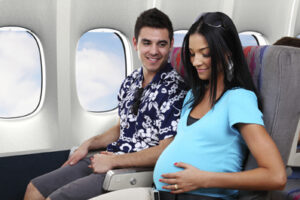SHARE WITH FRIENDS:
Traveling during pregnancy
Usually pregnancy is not considered a great time to travel.However, it is impossible to suspend your life for nine months and during this time you will want to take a vacation and spend the holidays. However, it is generally recommended that pregnant women not travel to tropical regions in developing countries and try and limit any travel during the last six weeks of pregnancy.
In some countries, the cost of medical care is very high and payments for unexpected hospitalizations during preterm birth and childbirth can range up to thousands of rand.
Is there a better time to travel during pregnancy?
The best time to travel is usually occurs in the second trimester of pregnancy. Early nausea
usually past that time, and most women are still comfortable with their size. The baby is not very close to birth, so it is not possible to enjoy the holiday and your tummy will still be sensible.
If possible, plan your trip for frequent breaks. Getting up and moving, having easy access to the toilet, and stretching a bit will benefit the extra time you reach your goal. Sitting quietly for a few hours and having limited movement is not only uncomfortable, but also bad advice. Usually, 5-6 hours is enough for a pregnant woman to sit in one place, she needs to get up and move.
Wear comfortable, easy-to-wear clothing that has some comfort when traveling. If the feet and ankles are not used, a slight swelling is normal.
Air travel / flight
Some people believe that low pressure inside (incorrect) air vessels can trigger complications. When combined with the relatively low level of oxygen inside the aircraft, this will make it necessary to avoid traveling on the aircraft as much as possible. In both accounts, this is incorrect. The baby is protected by the mother's thick, muscular uterine wall and the buffering property of the amniotic fluid. Your body adapts to the pressure and atmospheric changes around you so your baby doesn’t break down.
Creating comfortable living spaces is different when you are pregnant. It is advisable to spend this money well and think about renovating the usual seat space. If you can, don’t be afraid to ask for a free update at the registration desk. Showing your pregnancy as a cause may be enough to ensure a more comfortable flight!
Many airlines impose restrictions on their flights if pregnant women have complications or have multiple pregnancies. In such cases, it may be necessary to get medical permission from your doctor.
What about blood clots?
Wherever you can be, book a place in the hallway so you can stand and walk more easily. Deep vein thrombosis (DVT) is more common during pregnancy and one of the most effective ways to prevent it is to walk. Stretching, twisting the toes, drinking plenty of fluids, and wearing unrestricted clothing also help.
Some women with varicose veins are advised to wear a support hose. These help to improve blood circulation to the backup of the legs. They also prevent swelling and accumulation of blood in the lower legs. If you benefit from wearing them, consult a midwife or doctor.
Traveling by boat
Some pregnant women experience motion sickness for the first time while traveling in a boat. Usually medications are not recommended, but one of the options that has proven to be effective is acupressure tapes. These put pressure on the acupuncture points on the wrist. Try to get plenty of fresh air on board and pay attention to the horizon. If a buffet-style meal is offered, what to eat watch . Cold processed meats and pre-cooked salads can be dangerous to store Listeria. Preferably eat only hot food and if in doubt, do not risk eating something you are not sure about. So leave an extra suit and take the crackers!
Be careful with your drinking water and only drink from sealed bottles. Ice cubes, water for brushing teeth, and residual water in salad leaves and fruits - these have caused countless annoying stomachs.
Traveling by car
Pregnant women are not sure about using a seat belt when traveling in a car. They are especially concerned that the pressure of the lap band can cause excessive force on the baby or placenta. Seat belts save lives, pregnant women and anyone who wears it. Consistent, evidence-based advice from experts is always interconnected.
Watch what you eat in terms of acceptable food and try to take your meals and snacks with you. If you have to buy food on the go, try to eat at a fast food restaurant where the rules of handling food and the likelihood of a quick turn of food are high.
The airbag protects in the event of an accident. If the airbag is on, it does not pose a risk to the pregnant woman and her baby.
Traveling by public transport
Take the time to plan your trip and try to plan to optimize your chances of getting a seat. In the early months of pregnancy, before you start showing up, it’s unlikely that you’ll evoke sympathy from other passengers that will give you the opposite. But as you approach that period, you may feel a similar need.
If you need to stand all the way during the trip, move your legs a bit and try not to stand in that position too long. If you need extra exercise, take a break more than usual. This is a random walk increase your aerobic exercise the best way as well , helps keep your weight under control
Immunization
It is important to check the status of immunization before traveling to another country. Vaccines that contain live viruses are usually not recommended during pregnancy, but those that do not contain live substances are safe. Consult a dedicated travel physician or health care professional to assess the risk of infection or infectious diseases while traveling.
huggies.uz
